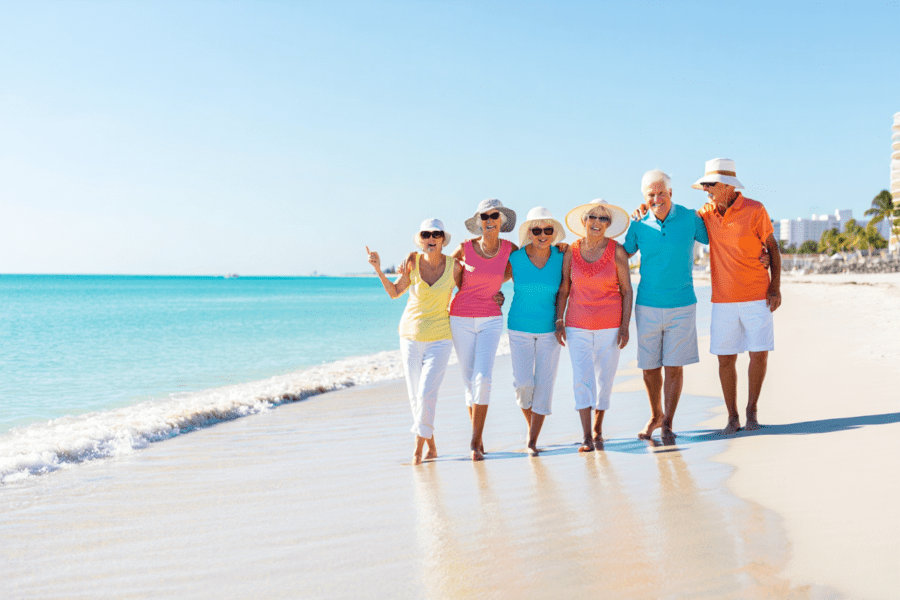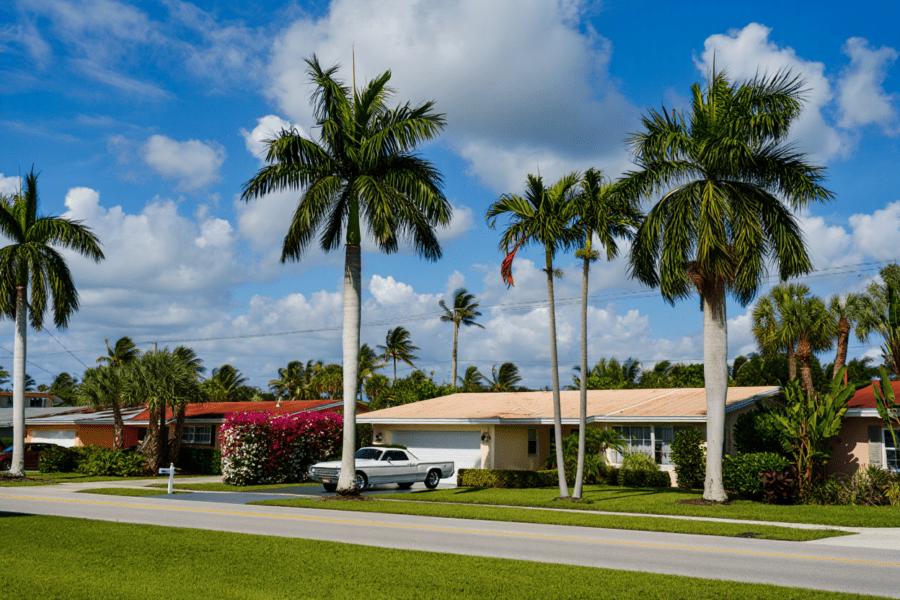When we think of the Bahamas, we think of stunning beaches, warmer climates, and, of course, a relaxed lifestyle. These are, indeed, the pillars of a good life there, but living in the Bahamas is so much more than that. Have you ever thought about making your summer destination a daily reality?
According to the World Migration Report, the Bahamas has no less than 64,000 international migrants, which is quite high considering its small population size. With all the income perks that automatically come with the island nation, it’s really no surprise.
The Bahamas has by far one of the highest GDP per capita in the Caribbean. In fact, combined with tax benefits like no capital gains or inheritance taxes, high-net-worth individuals could substantially build their nest eggs and pass on more wealth to their children. However, you might have to prepare yourself for added costs such as stamp fees, import duties, and value-added tax, which can definitely hike your daily living expenses.

Retiring in the Bahamas: Is it even a good idea?
There are plenty of steps for U.S. citizens to keep in mind if they want to move to the Bahamas. First, they’ll have to apply for and receive a single-entry visa. Generally, these aren’t considered too hard to get.
As soon as you have three successful trips to the Bahamas with single-entry visas, you can apply for a multiple-entry visa, which might let you stay for a period longer than 90 days. However, things can get quite pricey, especially if you are looking to establish a permanent residency in the Bahamas as a U.S. retiree.
One of the most efficient ways to establish permanent residence could involve purchasing property worth a minimum of $1,000,000, then holding it for at least ten years. Since this is quite a high bar for entry, what you might want to try instead is to keep a Bahamas “residence permit” (or, as you wait for your ten years to finish).
This annual permit has more than one initial requirement, such as proof that you can support yourself, generally coming from your bank or a Certified Public Accountant, medical, marriage, and even birth certificates, and two character references.
Well, unlike other visa perks that come with Panama retirement tax benefits, retiring in the Bahamas doesn’t really get you special discounts on utility bills, transportation, or medicines, for that matter. But the Bahamas has something Panama doesn’t for us: no capital gains tax.
Bahamas capital gains tax
Bahamian citizens and resident aliens aren’t exactly levied capital gains tax on assets such as stock or real estate in the Bahamas. This can actually be good news for U.S. investors who decide to pay a federal tax between 10% and 37% on capital gains, and state taxes are added.
Even if you still could be subjected to federal taxes in the Bahamas, you might not really have to pay state taxes on capital gains. This is especially true if you sell a non-U.S. asset and the state you are leaving still uses the following factors, especially when determining your resident tax status, which includes time spent within state lines, property ownership, mailing address, and family and business ties in the state.
Even so, it’s fairly important to note that each and every state determines your “tax residency” a bit differently. Make sure you check out your state’s Department of Revenue site for more specific guidelines before you move.
Bahamas tax rate on retirement income
Another benefit of retiring there is that there’s really no tax on retirement income. Instead, residents need to deal with other types of taxes on other types of transactions. Similar to capital gains, you will more than likely need to pay federal income tax rates as a U.S. retiree.
However, you might still be able to exclude a certain amount of income with the Foreign Earned Income Exclusion. Some of the most important requirements include having foreign-earned income that was earned while still in the Bahamas.
Then, there is another important point: establishing your tax home in the Bahamas, living in the Bahamas for an entire calendar year, and being physically there for a minimum of 330 full days for 12 consecutive months.
If you are eligible for the FEIE, you could exclude as much as $130,000 of foreign-earned income in 2025. This also includes any kind of freelance work conducted on the side, commissions, as well as salary income. But it still does not include Social Security or any other retirement benefits, such as annuities or pensions.

The Bahamas has zero inheritance, estate, wealth, or gift taxes
The Bahamas sweetens the pot first by not levying estate, wealth, or gift taxes. This can be a huge factor, considering popular retirement countries such as France and Germany, which can both levy some of the highest inheritance taxes in the world.
Moreover, unlike one of the tax reasons not to retire in Portugal, there isn’t a specific “forced heirship” in the Bahamas. This also means you have more control over who receives your assets and how much you would like to give.
Naturally, as with other taxes on this list, you might still need to pay U.S. federal tax on inheritances. There could be some taxes you haven’t paid before, especially when planning a move to the Bahamas.
What are the main tax disadvantages of living in the Bahamas?
Even if the Bahamas is known to have low taxes in a couple of areas, other tax rates could be relatively high, especially compared to what you are currently paying. For example, let’s talk:
- import duties. Since the Bahamas are an island nation, it mainly relies on imported goods. Levied duties can drastically range, with the highest being 220%. In comparison, mainland U.S. import duties can easily peak at 37.5%.
- value added tax (VAT). Very similar to a sales tax, Bahamian VAT is around 10% for most goods and services. Depending on where exactly you live in the United States, your state could have low sales taxes.
- stamp duty. Akin to a real estate transfer tax, Bahamian properties purchased for more than $100,000 levy a 10% duty on the buyer. If it were to compare them, states in the United States levy as much as 4% tax, per Property Shark.
Naturally, in such cases, a trusted tax professional for guidance on your financial situation could be the best way to understand exactly how much you and your family might end up being affected by taxes in the Bahamas. However, despite your very specific circumstances, almost every single United States retiree could be easily impacted by higher costs on some goods and housing.
Bahamas cost of living
Unfortunately, the Bahamas still have a much higher national average cost of living than many other places in the United States, and this is mainly because of import fees and duties. Online database Numbeo, as of June 2025, proved how the average retiree living in the Bahamas could end up paying higher costs, if:
- Their 1-bedroom rent prices are up to 24% cheaper than in the United States, or their 3-bedroom apartments are 25% to 42% more expensive than their American counterparts.
- We talk about clothing such as jeans, dresses, or running shoes, which may be up to 26% more costly than in the United States.
- We mention groceries, since they are much pricier in the Bahamas. For instance, milk can cost 299.5% more than in the United States, while tomatoes and eggs are 45% to 80% more expensive.
If you found this article revealing, we also recommend checking: Over 50? These Problems Can Sneak Up on You


















10 Responses
z9sel7
vlakuq
Hi, i believe that i saw you visited my site thus i came to “go back the prefer”.I’m attempting to find issues to improve my site!I suppose its adequate to make use of some of your concepts!!
o0wop8
Hello very nice web site!! Man .. Beautiful .. Amazing .. I’ll bookmark your website and take the feeds additionally…I am satisfied to search out so many helpful information here in the post, we need work out extra techniques in this regard, thanks for sharing. . . . . .
buft73
oka3tg
vu6stg
Wow! Thank you! I continuously wanted to write on my site something like that. Can I take a portion of your post to my website?
owkrgumwdrjvrohkuliyjqfjztrmnf